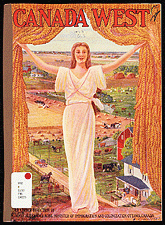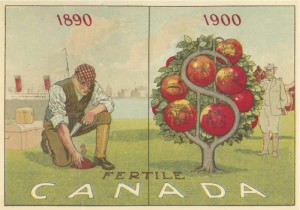2] Read Susanna Moodie’s introduction to the third edition of Roughing it in the Bush, 1854. I use the Project Gutenburg website which has a ‘command F’ function that allows you to search the entire document by words or phrases. Moodie’s introduction is often read as a warning to would be emigrants as well as an explanation of why her family emigrated from Britain. See if you can find echoes of the stories discussed above: a gift from god, a second Garden of Eden, an empty/wasted land, the noble but vanishing Indian, and the magical map. By echoes I mean reading between the lines or explicitly within Moodie’s introduction. Discussing what you discover, use your examples as evidence to write a blog that explores what you think might have been Moodie’s level of awareness of the stories she carried with her. And accordingly, the stories that she “resurrects’ by her appearance in the Dead Dog CafŽ in Green Grass Running Water.
When I use the command F function and look for phrases used in the question for this prompt, all searches find the exact words later in the text Susanna Moodie has written. I felt like I was already introduced to these ideals in the introduction even if it had not been stated directly.
Something that really struck me about this piece was Moodie’s deliberate stating of the roughness and hardship of the decision to migrate to Canada. She emphasizes that it was not the wealthy men of high society who decided to leave the their land. It was “the emigrant’s hope of bettering his condition, escaping vulgar sarcasms too often hurled at the less wealthy by the purse- proud common place people of the world” (Moodie). Moodie comments on how migration to Canada was encouraged by “the snares of their artful seducers” (Moodie) in other words was highly exaggerated and encouraged by diplomats and persons of power. This gives us the impression that Canada was in fact labeled as a gift from god, also known as a second Eden. The term “second eden” is interesting. Within the Garden of Eden, man was supposed to stay pure yet Eve ate the apple. Now I could relate this to the emphasis of men in Moodie’s story though I doubt that is the prevalent comparison. The Garden of Eden was meant to be a divine place in which the devil could not touch man. By saying that the early Canada was meant for “those rich in hope and poor in purse” (Moodie), Canada was only for those of strong resilience who wished to work for their fortune. “Men of all grades rushed to hear your hired orators declaim upon the blessings to be obtained by the clearers of the wilderness”(Moodie), this quote is bringing us closer to the spiritual aspect of Canada and the divine wish of using this “wasteland”, somewhat like the Garden of Eden once was.
At this time although wealthiness also correlated with the amount of usable farmland one owned, monetary wealth was also in high value. Monetary wealth at this time could compare to the amount of food which was in the garden of Eden. I stumbled upon this ad, which was published in 1903. It was used to advertise Canada to the United States (even though it is not European I believe I can still use it as evidence).
Here we have an apple tree, which at this point had become an iconic view of prosperity and wellness due to the biblical story, and the tree is made into a dollar sign. Signifying that this material prosperity would bring monetary wealth which was currently the goal of a poor man’s migration to the praries.
I particularily emphasize the “Second Garden of Eden” because it is one of the major reasons for colonization.

Here I found another advertisement published by Canada West in 1923. It has a woman opening the curtains to a endless farmland. This also brings the meaning of fertility into play, the idea of raising a family in this new found land. Somewhat similar to what Adam and Eve were supposed to do
Tc2.ca,. ‘TC2 Source Docs – Prairie Immigration And The “Last Best West”‘. N.p., 2015. Web. 8 July 2015.
Moodie, Susanna. Roughing it in the Bush.. Project Gutenburg, 18 January 2004. Web. 8 July 2014.
Collectionscanada.gc.ca,. ‘ARCHIVED – Immigration – Contact – The Canadian West – Exhibitions – Library And Archives Canada’. N.p., 2015. Web. 8 July 2015.
